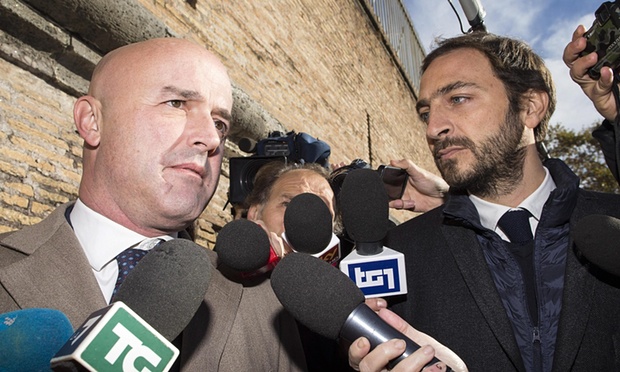Vatican Set for Diplomatic Clash with Italy over "Vatileaks" Prosecution
By Stephanie Kirchgaessner
Italy is facing a diplomatic collision with the Vatican over the church’s prosecution of two Italian journalists in a case that has been broadly condemned by press freedom groups. A media watchdog that chronicles acts of intimidation against Italian journalists said Italy would have the legal right to reject any attempt by the Vatican to seek the extradition of the two journalists – Gianluigi Nuzzi and Emiliano Fittipaldi – if the pair are found guilty by a Vatican court of publishing classified and leaked documents. The trial of the journalists and three former Vatican officials – who have been charged with leaking the documents – will continue next week after being adjourned on Monday. The journalists technically face up to eight years in jail if they are convicted. “Italy very easily should and could refuse any extradition request because we have an article in our penal code that says such a request can be refused if the alleged ‘crime’ the person has been charged with is itself against the paramount principles of Italian law,” said Alberto Spampinato, a journalist and founder of the NGO Ossigeno per l’Informazione (Oxygen for information). Another expert, Professor Giulio Illuminati of LUISS in Rome, said there was no legal framework for the Vatican to seek the journalists’ extradition because the Vatican does not have an extradition agreement with Italy. Illuminati also noted that Italy could question the fairness of the trial since the Vatican is not a signatory to the European convention on human rights. The Vatican charged Nuzzi and Fittipaldi just weeks after both journalists released books that contained embarrassing allegations about financial mismanagement of Vatican funds. The Vatican – a sovereign city-state within the city of Rome – has not disputed any facts contained in the books, but the pair are being charged under a law that was passed under Pope Francis in 2013 that makes it a crime to leak or publish classified documents. In Italy there are a number of laws that protect journalists’ right to publish controversial information. While it can be illegal to publish information contained in classified documents, Spampinato said that a journalist in Italy would only be charged with a crime if the publication of a leaked document was deemed a threat to national security. Article 21 of Italy’s constitution also protects freedom of speech and expression. Although the case has received attention from various press freedom groups, the Italian government has so far been silent on the charges against the Italian journalists. “The government is being very prudent, like looking on from a window at what is happening. The relations between Italy and the Holy See are very diplomatic and regulated by law,” said Spampinato. The silence of Italy’s political leaders has been heavily criticised by one prominent voice: Ezio Mauro, the longtime editor-in-chief of the Italian daily newspaper la Repubblica. “We haven’t heard the voice of one politician,” Mauro said in his morning news conference, which is published online. “Maybe politicians should say something: maybe the PD [the ruling Democratic Party] should raise its head from the small-bore cannibalistic intestinal squabbles that it envelops itself in every day. The prime minister should give us his opinion, and the justice minister should say a word.” The influential editor also pointed an accusatory finger at the pope himself, suggesting it was impossible to reform the Vatican into a more transparent institution, as Pope Francis has said, if journalists are punished for doing their jobs. “You can’t practise transparency and freedom and then put on trial not those who are the authors of bad government and misuse of the Holy See’s finances but the journalists who exposed what is rotten in the Vatican,” Mauro said. Following their indictment on criminal charges last month, both journalists willingly attended their first hearing inside the Vatican walls. They are not being held within the city-state. The journalists have noted some irregularities involving their trial, including the fact that neither were given documents about the charges against them until the day of the first hearing. The Vatican has insisted that it is not seeking to target speech by prosecuting the journalists. “The trial is not about liberty and freedom of journalism. Criminal activities are criminal,” said Thomas Rosica, a Vatican spokesman. But there is little available information about the precise nature of the crime the journalists have been accused of. Fittipaldi has sought to have charges against him dropped because Vatican prosecutors have not detailed which classified documents he is alleged to have used. “We are waiting and hoping that something will happen that will make the situation clearer for the journalists,” said Spampinato. Giulia Bongiorno, a well-known Italian defence lawyer who is representing Francesca Chaouqui, a public relations official who formerly worked for the Vatican and was charged with leaking confidential documents, said the fundamental rights of her client were being “seriously infringed”. Bongiorno was barred from representing her client inside the Vatican courtroom because she was not approved by the Vatican. “The execution in Italy of the criminal conviction would not be allowed since the Vatican procedure has been unlawful and partially in breach of the rules governing a due process of law,” Bongiorno told the Guardian.
|
.
Any original material on these pages is copyright © BishopAccountability.org 2004. Reproduce freely with attribution.
